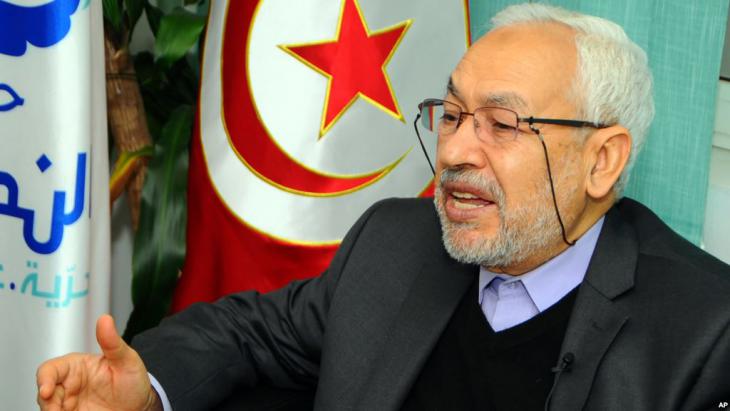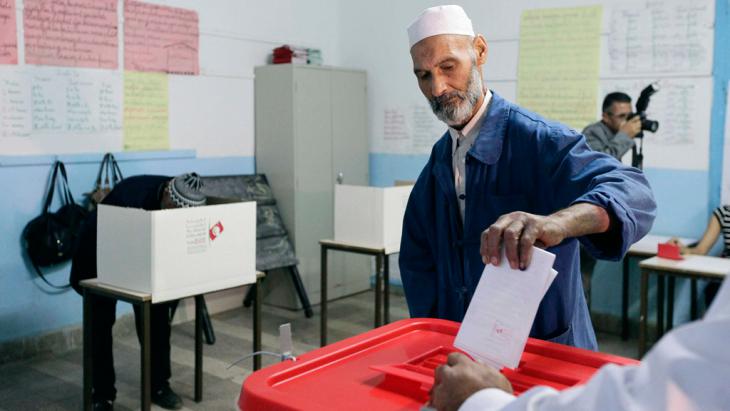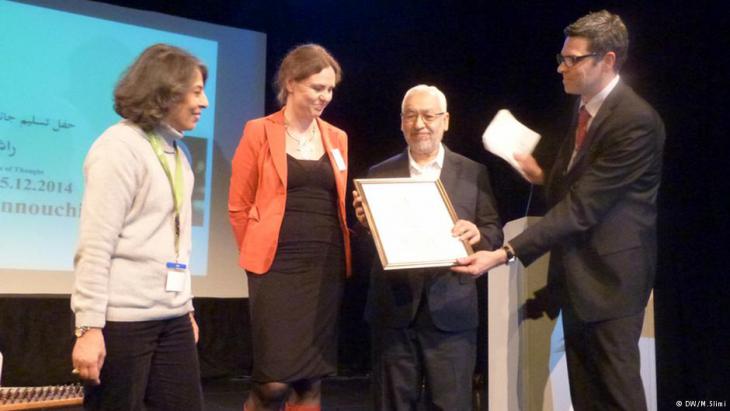"If you sow dictatorship, you harvest terrorism"

Mr Ghannouchi, the new Tunisian constitution passed last January is regarded as the most secular constitution in the Arab world to date. Was it difficult for you to agree to it?
Ghannouchi: No, we're very proud of this constitution. We not only supported it; we also helped develop it. I don't regard it as a secular constitution, but as one that unites Islam, democracy and modernity.
We don't see any conflict between moderate secularism and moderate Islam. There are Christian democratic parties in many European countries, such as Germany; elsewhere, there are democratic parties with Buddhist or Hindu backgrounds. Why should there not be Islamic democratic parties?
The Tunisian constitution grants far-reaching freedom of religion and conscience, which can also including turning away from religion. That's very unusual for the Arab world...
Ghannouchi: …That is something that is written in the Koran: there is no compulsion in religion.
Nevertheless, apostasy is a crime in some Arab countries...
Ghannouchi: Unfortunately, that's an interpretation some people follow. But I don't share it. In Islam, we don't have a Church that could claim to speak in the name of God or of Islam. There has always been a freedom in and a wide variety of interpretations of Islam. In my work and my books, which I wrote in the early 1990s, I set out that Islam guarantees freedom of religion and conscience, and that this applies in both directions: for adopting and rejecting the faith.

Have you not received a great deal of criticism for this stance, for instance from the Salafists?
Ghannouchi: There have always been different schools of thought throughout the history of Islam. But for 14 centuries of Islamic history, Islamic societies have always been pluralist and accepted people who followed other religions or none at all, and guaranteed this freedom and diversity. This acceptance of diversity is not something we had to import from the West either. When we look at Western countries, acceptance of diversity only evolved there after the Renaissance. Before that, there were religious wars that lasted for decades.
The French Revolution is regarded as the birth of enlightenment, democracy and human rights. What's your position on these values?
Ghannouchi: The Tunisian constitution is founded on two pillars: the principles of Islam and the principles of modern society and human rights, which are a product of the Enlightenment. The Universal Declaration of Human Rights was drawn up by people of many different cultural origins.
There is also an "Islamic Declaration of Human Rights", which was drawn up in 1990 by several Muslim states and which deviates from the Universal Declaration of Human Rights in a number of points, for instance on equal rights for women and men or rights for minorities. What do you think of it?
Ghannouchi: It represents an attempt to combine the principles of Islam with the Universal Declaration of Human Rights. But for me, there's no contradiction between human rights and Islamic values. We accept that in our constitution, and that's also part of the foundations of my thinking.
What do you say to groups that attempt to implement their radical interpretations of Islam by means of violence?
Ghannouchi: This phenomenon is based on an extreme reading of Islam, but it's also the product of a certain political and socio-economic situation that produces such abnormal interpretations. But this is not a specifically Islamic phenomenon. After all, there have been extremist, terrorist organisations at different times and in all sorts of countries. One only has to remember the Baader-Meinhof group in Germany or the Red Brigades in Italy. Two things are needed to undermine these kind of groups: democracy and human development.

Tunisia is a democracy now. However, it also exports an above-average number of jihadists who are now fighting in Syria. How do you explain this development?
Ghannouchi: The people who are now in Syria are not children of the Tunisian revolution, which took place only four years ago; they grew up under Ben Ali. We have to understand the causes of the conflict: this violent extremism is a reaction to and a result of the dictatorships under which these young people grew up – Ben Ali, Gaddafi, Mubarak, Assad, Saddam Hussein... If you sow dictatorship, you harvest terrorism.
How can Tunisia protect itself from this extremism and stop itself from sliding into chaos and civil war?
Ghannouchi: Yes, we are living in a crisis-stricken region. But I believe we have a strong common understanding of the state in Tunisia; it's a relatively homogenous society and the education level is fairly high, compared to the rest of the region. Moreover, the form of Islam that people believe in is rather moderate. That's why I believe and hope that a successful democratic development in the country will stop terrorism and extremism from evolving in Tunisia.
Critics accuse Ennahda of not having taken tough enough action against extremist Salafist groups during its time in government. There were two political murders of left-wing opposition activists, which shocked the country. What do you say to these accusations?
Ghannouchi: Our political opponents and competitors have made such allegations. Foreign media picked up the accusations and that turned them into facts. Terrorism existed before Ennahda was in government and it existed afterwards. It's an international phenomenon of which Tunisia has its share – and I hope that this share will remain very minor.
Interview conducted by Daniel Bax and Tsafrir Cohen
© Qantara.de 2014
Translated from the German by Katy Derbyshire
